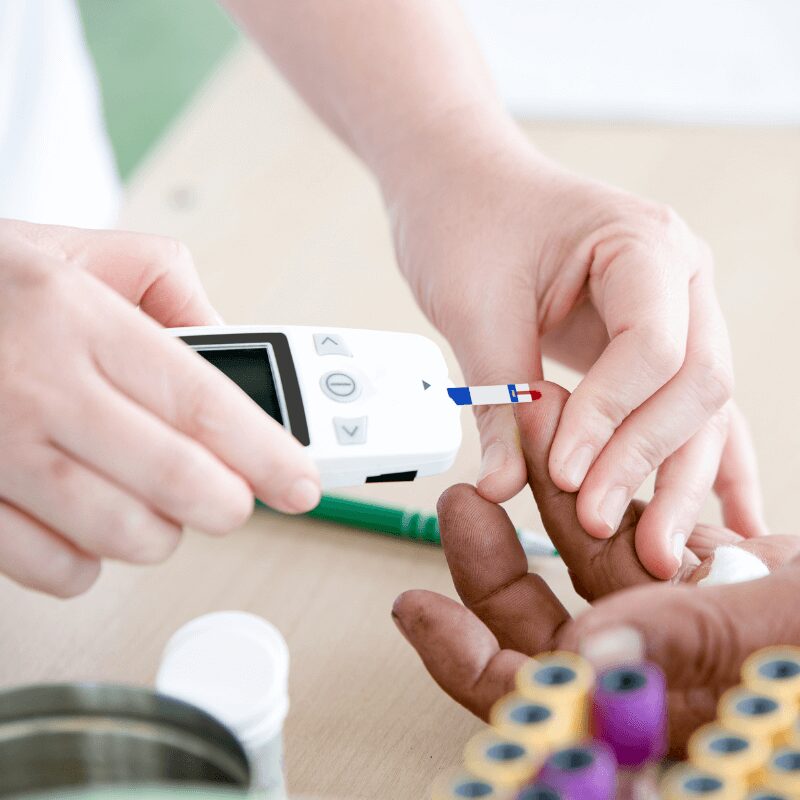Embarrassed about your bad breath? While it may seem like having big helpings of garlic or onions is the primary reason behind your problem, it’s essential to understand that bad breath can be caused by several underlying medical conditions. Bad breath can significantly impact your self-confidence, relationships, and overall quality of life.
Here at Advanced Indiana, we can usually pinpoint the causes of your bad breath during your routine dental exam. However, other causes may need to be checked by your physician. However, we’ll work closely with your primary care doctor to help get to the root cause of your bad breath. These are just a few medical conditions that could be at the center of that rotten smell.
Determining the Cause of Bad Breath & When to Be Concerned
Bad breath, medically known as halitosis, can be a tricky issue to diagnose due to its myriad of potential causes. The process of pinpointing the cause usually begins with a thorough oral examination. Our dentists will evaluate your oral hygiene habits, check for gum diseases, and even ask about your diet, as certain foods tend to cause a foul odor. If we rule out oral causes, we may recommend you visit your primary care doctor, as persistent bad breath can indicate various medical conditions.
Importantly, it’s essential to be proactive about bad breath. If you notice a consistent foul smell from your mouth, even after maintaining good oral hygiene, or if others comment on your breath, it’s time to raise the concern with your healthcare provider. Not only can this prevent potential embarrassment, but it could also be a vital first step in identifying an underlying health condition requiring attention.
5 Medical Conditions Tied to Bad Breath
1. Dry Mouth
Saliva is a natural mouth cleanser, washing away decay-causing bacteria and food particles that lead to bad breath. A lack of saliva, called xerostomia, can result in a dry mouth, making it more likely to develop bad breath. Several medical conditions, such as autoimmune diseases, medications, and cancer therapy, can cause this condition. Drinking water, chewing sugarless gum, or using over-the-counter dry mouth products can temporarily relieve dry mouth.
2. GERD
Gastroesophageal reflux disease (GERD) is when stomach contents back up into the esophagus. Bad breath is a common side effect of GERD since the stomach’s acidic contents can travel into the mouth. Treatment options include medication or surgery, depending on the severity.
3. Respiratory Tract Infections
Respiratory tract infections, such as bronchitis, pneumonia, and sinus infections, can cause bad breath. These infections can lead to the accumulation of mucus in the mouth and throat, providing a perfect environment for bacteria growth. Proper treatment of these infections will address the root cause of bad breath.

4. Diabetes
People with diabetes are prone to developing certain conditions that lead to bad breath, such as periodontal disease and ketoacidosis. Periodontal disease occurs when bacteria around the gums and teeth cause inflammation and foul breath. In contrast, ketoacidosis happens when the body doesn’t have enough insulin to convert glucose to energy, causing the body to burn fat instead. The byproducts of this process, such as ketones, tend to produce a fruity-smelling breath.
5. Kidney Failure
Kidney failure, a condition where the kidneys don’t function properly, can lead to bad breath. One of the reasons behind the foul breath is uremia, which is a buildup of waste products in the bloodstream. Proper treatment of the underlying renal disease can help address the root cause of bad breath in such cases.
Dental Causes of Bad Breath
While the medical conditions detailed above can indeed contribute to bad breath, it’s important not to overlook the vast array of dental issues that can also be culprits. Oral health is directly linked to breath freshness; neglecting dental care can lead to unpleasant odors.
Poor Oral Hygiene
Neglecting to brush or floss regularly can lead to food particles in the mouth, promoting bacterial growth between teeth, around the gums, and on the tongue. This bacteria often results in bad breath and is one of the most common causes.
Gum Disease
Persistent bad breath or a bad taste in the mouth can also indicate gum disease. This is caused by plaque buildup on teeth due to poor oral hygiene, leading to toxins that irritate the gums and a resulting foul odor.
Dental Cavities
Untreated dental cavities can also be a source of bad breath. The decay process generates a particularly unpleasant odor that regular brushing and flossing can’t remove.
Oral Infections
Post-surgical wounds or mouth infections can cause bad breath. Once the wound or infection is treated, the bad breath often disappears.
Proper dental hygiene, routine dental check-ups, and treatment of any oral disease are essential to keeping your breath fresh and healthy.
Combating Bad Breath at Home: Effective Strategies
Here are some practical strategies to maintain fresh breath right in the comfort of your home:
1. Hydrate
Stay hydrated throughout the day, particularly after meals, to maintain a moist mouth and wash away food particles and bacteria.
2. Healthy Snacks
Chewing on raw, crunchy fruits and vegetables can increase saliva production, which helps cleanse your mouth and freshen your breath.
3. Cut Down on Odor-Causing Foods
Certain foods, such as garlic, onions, and certain spices, can contribute to bad breath. Consider eliminating or reducing these from your diet.
4. Limit Coffee and Alcohol
Both coffee and alcohol can dry out your mouth, leading to bad breath. Try to reduce your consumption of these beverages or switch to water or herbal teas whenever possible.
5. No Smoking
Smoking not only gives you bad breath, but it also stains your teeth, irritates your gums, and can even lead to mouth cancer. Consider seeking help to quit if you’re having trouble.
6. Use Mouthwash
While it’s not a long-term solution, using a mouthwash can provide temporary relief from bad breath. However, don’t use it as a replacement for brushing and flossing.
Remember, while these strategies can help control bad breath, they’re not a substitute for regular dental check-ups and professional cleaning. If your bad breath persists, it’s important to consult with a dental professional to rule out any underlying health issues.

Talk to Your Dental Team About Your Bad Breath Concerns
Several underlying medical conditions can cause bad breath, so it’s important to discuss your concerns with our dental team here at Advanced Indiana. We can help pinpoint the root cause and provide you with a pathway forward.
Worried about your dental health? Schedule an appointment with our Fortville, Anderson, or Indianapolis, IN offices today. We’ll get you on the calendar for a cleaning and oral cancer screening to see if we can’t pinpoint the cause of your bad breath!

